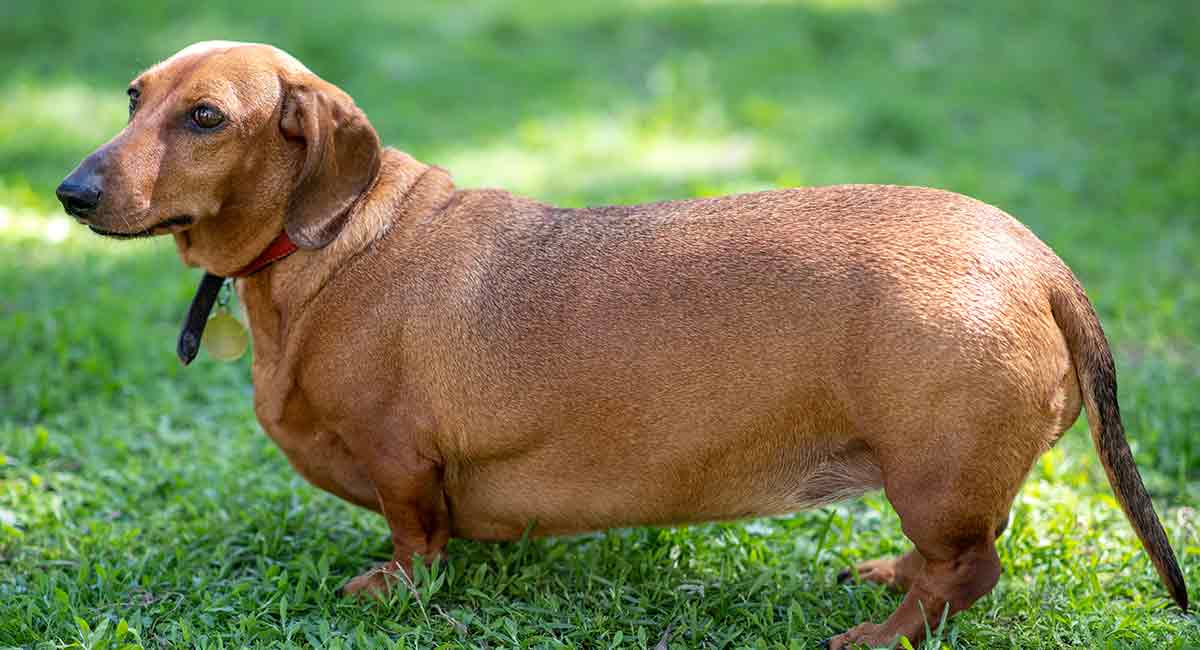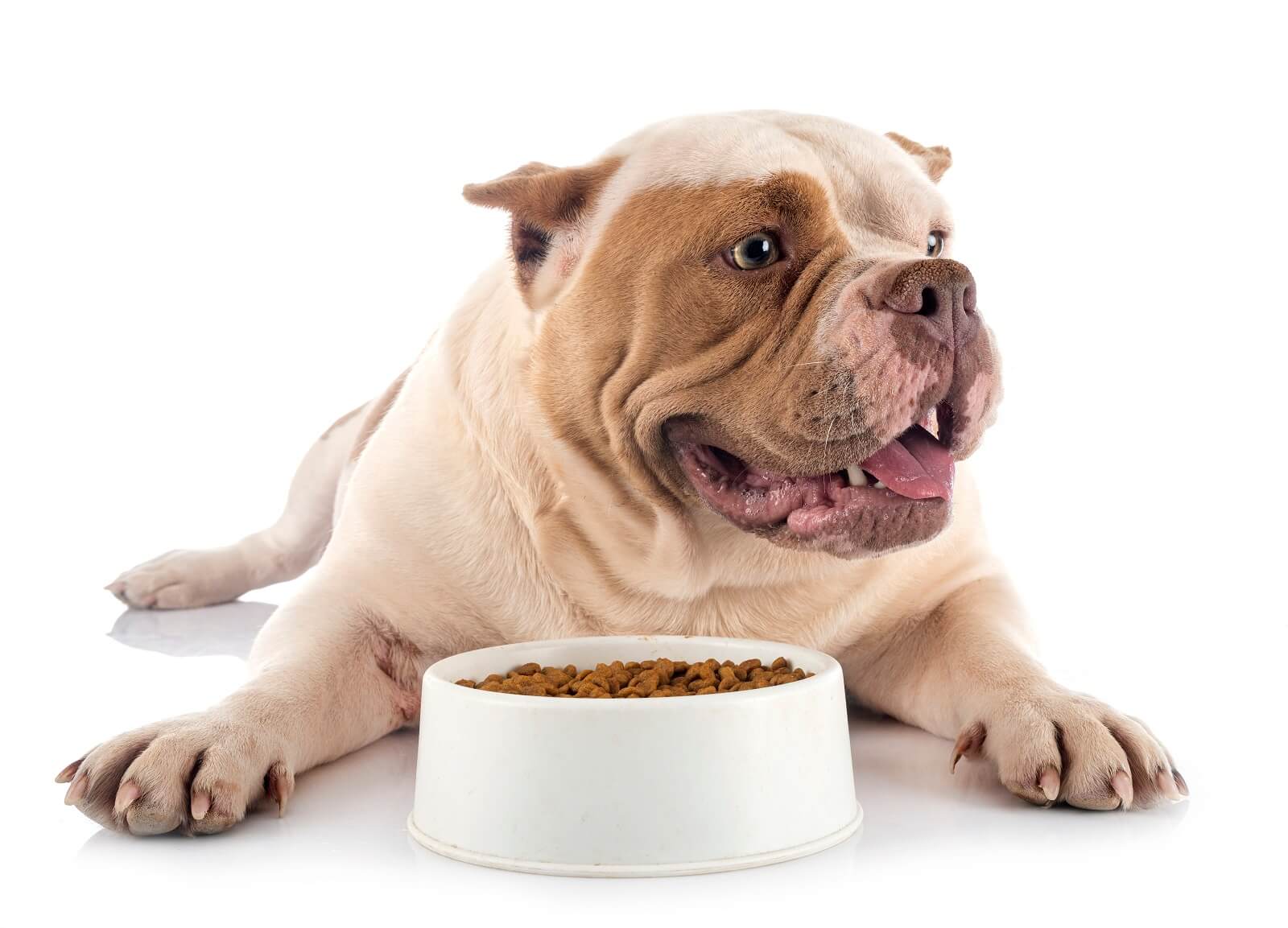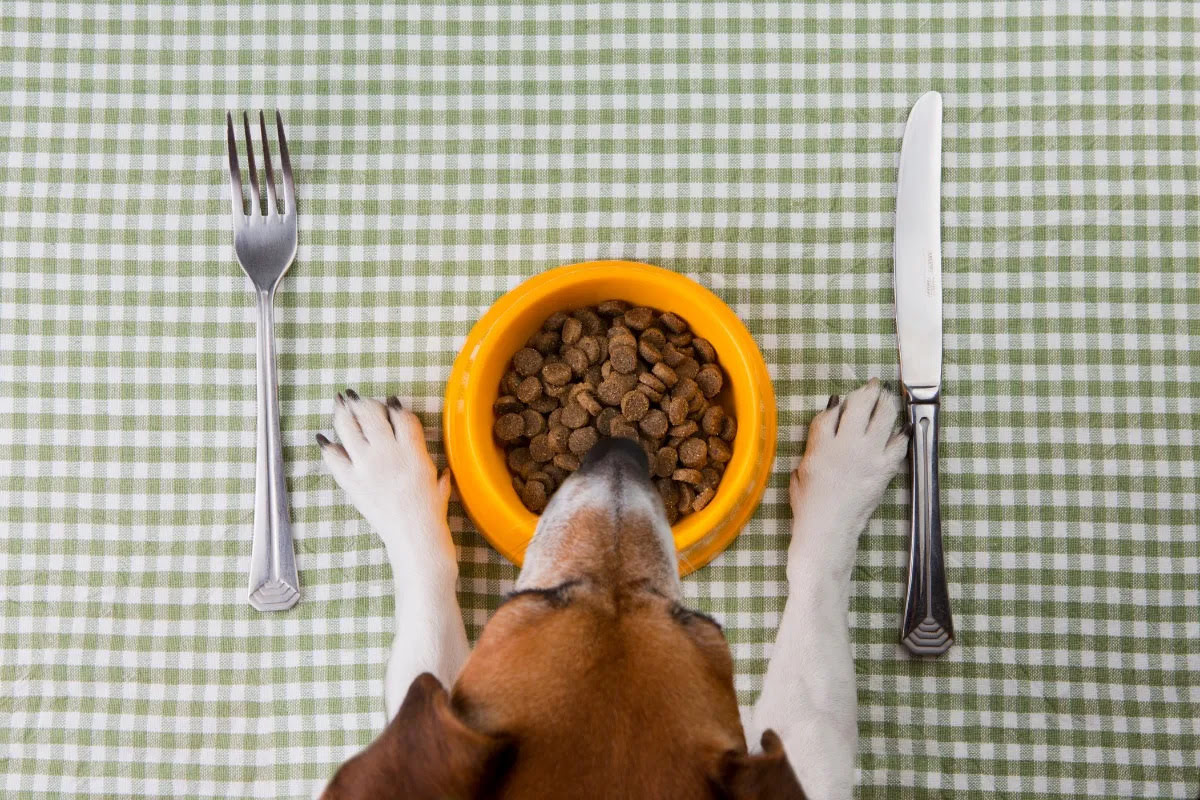Home>Health & Wellness>Nutrition & Diet>How To Put Your Fat Dog On A Diet


Nutrition & Diet
How To Put Your Fat Dog On A Diet
Published: January 29, 2024
Learn how to manage your dog's nutrition and diet to help them lose weight and stay healthy. Find expert tips and advice for putting your fat dog on a diet.
(Many of the links in this article redirect to a specific reviewed product. Your purchase of these products through affiliate links helps to generate commission for Pawsomeoldies.com, at no extra cost. Learn more)
Table of Contents
Introduction
Having a furry companion is a source of joy and companionship, but as pet owners, it's our responsibility to ensure their well-being. Just like humans, dogs can struggle with weight issues, and addressing this concern is crucial for their overall health and longevity. If you've noticed that your beloved canine friend has gained excess weight, it's essential to take proactive steps to help them shed those extra pounds and regain their vitality.
Obesity in dogs is a prevalent issue that can lead to various health complications, including joint pain, diabetes, and heart disease. By addressing this problem early on, you can significantly improve your dog's quality of life and reduce the risk of potential health issues. In this comprehensive guide, we will explore the essential steps to help you put your overweight dog on a diet and set them on the path to a healthier lifestyle.
It's important to approach this process with patience, empathy, and a commitment to making positive changes for your furry friend. By implementing a well-rounded plan that includes dietary adjustments, exercise routines, and regular monitoring, you can support your dog in achieving a healthier weight and overall well-being. Let's embark on this journey together and empower your dog to lead a happier, more active life.
Read more: How Much Fat Should A Dog Have In His Diet
Understanding the Problem
Before embarking on the journey of putting your overweight dog on a diet, it's crucial to gain a comprehensive understanding of the factors contributing to their weight gain. Just like humans, dogs can become overweight due to a variety of reasons, and identifying the underlying causes is the first step towards formulating an effective weight management plan.
One of the primary factors contributing to canine obesity is overfeeding. While it may seem like an act of love to provide your dog with abundant food, excessive portions can lead to an imbalance between calorie intake and energy expenditure. Additionally, feeding your dog table scraps or high-calorie treats can significantly contribute to weight gain over time.
Furthermore, lack of physical activity plays a significant role in canine weight gain. If your dog leads a sedentary lifestyle with minimal opportunities for exercise and play, they are more likely to experience weight-related issues. Reduced physical activity can lead to a surplus of unused energy, which is stored as fat in the body.
It's also essential to consider the breed and age of your dog when addressing weight concerns. Certain dog breeds are predisposed to weight gain, and older dogs may experience a natural decline in metabolism, making it easier for them to put on excess weight.
Moreover, underlying health conditions such as hypothyroidism or Cushing's disease can contribute to weight gain in dogs. These conditions can affect metabolism and energy regulation, leading to unexplained weight gain despite efforts to control diet and exercise.
By gaining a thorough understanding of the factors contributing to your dog's weight issue, you can tailor a targeted approach to address their specific needs. This knowledge will serve as the foundation for developing a personalized weight management plan that takes into account your dog's breed, age, activity level, and overall health.
Understanding the problem is the key to formulating an effective strategy that addresses the root causes of your dog's weight gain, setting the stage for a successful and sustainable weight management journey.
Consulting with a Veterinarian
Seeking professional guidance from a veterinarian is an essential first step in addressing your dog's weight issue. A veterinarian possesses the expertise to assess your dog's overall health, identify any underlying medical conditions that may be contributing to weight gain, and provide personalized recommendations for a safe and effective weight management plan.
During the consultation, the veterinarian will conduct a thorough physical examination of your dog, taking into account factors such as body condition score, muscle mass, and any signs of obesity-related health issues. They may also perform diagnostic tests to rule out underlying medical conditions that could be impacting your dog's weight.
Based on the assessment, the veterinarian can offer valuable insights into your dog's dietary needs, caloric requirements, and appropriate exercise regimens. They can also recommend specific dietary adjustments tailored to your dog's individual needs, such as portion control, nutrient-dense food options, and the incorporation of dietary supplements if necessary.
Furthermore, the veterinarian can provide guidance on establishing realistic weight loss goals for your dog, taking into consideration their breed, age, and overall health status. They can offer advice on monitoring your dog's progress, including regular weigh-ins and body condition assessments to track their weight loss journey effectively.
In some cases, the veterinarian may collaborate with a veterinary nutritionist to develop a customized diet plan that aligns with your dog's nutritional requirements while supporting weight loss goals. This collaborative approach ensures that your dog receives a well-balanced diet that meets their specific nutritional needs while promoting healthy weight management.
Additionally, the veterinarian can address any concerns or questions you may have regarding your dog's weight management plan, providing ongoing support and guidance throughout the process. Their expertise and professional insight play a pivotal role in formulating a comprehensive and tailored approach to help your dog achieve a healthier weight and improved overall well-being.
By consulting with a veterinarian, you can gain access to expert guidance, personalized recommendations, and ongoing support to navigate the complexities of canine weight management. This collaborative partnership sets the stage for a structured and effective weight loss journey, empowering you to make informed decisions that prioritize your dog's health and vitality.
Establishing a Feeding Schedule
Establishing a consistent and structured feeding schedule is a fundamental aspect of managing your dog's weight and overall nutritional intake. By implementing a well-defined feeding routine, you can regulate portion sizes, promote healthy eating habits, and support your dog's weight management goals.
When creating a feeding schedule for your dog, it's essential to consider their specific dietary requirements, activity level, and overall health status. The schedule should encompass regular mealtimes and portion control to ensure that your dog receives adequate nutrition without excessive caloric intake.
Start by determining the appropriate number of meals per day based on your dog's age, breed, and activity level. Puppies and younger dogs may require more frequent meals to support their growth and energy needs, while adult dogs can thrive on a structured feeding schedule with two meals per day.
Divide your dog's daily food allowance into the designated meals, ensuring that each portion aligns with their caloric needs and weight management goals. It's important to measure the food accurately to avoid overfeeding and to provide a consistent and balanced diet.
Consistency is key when establishing a feeding schedule for your dog. Aim to feed your dog at the same times each day, creating a predictable routine that supports healthy eating habits. By adhering to a consistent schedule, you can help regulate your dog's metabolism and prevent excessive snacking or overeating.
Incorporate feeding times into your daily routine, aligning them with your dog's activity schedule and ensuring that meals are provided in a calm and stress-free environment. Avoid free-feeding practices, as they can lead to uncontrolled food intake and disrupt your dog's weight management efforts.
Furthermore, consider the type of food you are feeding your dog and its nutritional composition. High-quality, nutrient-dense dog food that aligns with your dog's specific dietary needs can contribute to their overall well-being and weight management. Consult with your veterinarian to select the most suitable food options for your dog's individual requirements.
By establishing a structured feeding schedule tailored to your dog's needs, you can promote healthy eating habits, regulate portion sizes, and support their weight management journey. Consistency, portion control, and nutritional quality are essential elements of an effective feeding schedule that prioritizes your dog's health and well-being.
Choosing the Right Food
Selecting the appropriate food for your overweight dog is a critical aspect of their weight management journey. The right food can provide essential nutrients while supporting healthy weight loss and overall well-being. When choosing the ideal food for your dog, several key factors should be taken into consideration to ensure that their nutritional needs are met while facilitating effective weight management.
First and foremost, opt for high-quality dog food that is specifically formulated for weight management or weight loss. These specialized formulas are designed to provide balanced nutrition while controlling calorie intake, making them an ideal choice for dogs aiming to shed excess pounds. Look for products labeled as "light," "healthy weight," or "weight management" to identify suitable options.
When examining the nutritional content of dog food, prioritize products with lower calorie and fat levels, as well as higher fiber content. These attributes can aid in promoting satiety, regulating energy intake, and supporting healthy digestion. Additionally, seek out foods with increased protein content, as protein plays a crucial role in maintaining muscle mass and supporting your dog's overall health during the weight loss process.
Consider the specific dietary requirements of your dog based on factors such as breed, age, and any underlying health conditions. Some dogs may benefit from grain-free or limited ingredient diets, while others may require specialized formulations to address sensitivities or allergies. Consulting with your veterinarian can provide valuable insights into the most suitable food options tailored to your dog's individual needs.
Avoid free-feeding practices and excessive treats, as these can undermine your dog's weight management efforts. Instead, focus on providing measured portions of high-quality food at designated mealtimes, adhering to the feeding schedule established in collaboration with your veterinarian. By controlling portion sizes and minimizing calorie-dense treats, you can effectively manage your dog's caloric intake and support their weight loss goals.
Incorporating dietary supplements, such as omega-3 fatty acids or joint support formulas, may also be beneficial for your overweight dog. These supplements can contribute to overall health and well-being, particularly as your dog engages in increased physical activity as part of their weight management plan.
By carefully selecting the right food for your overweight dog, you can provide essential nutrition while supporting their weight loss journey. Prioritizing high-quality, specialized formulations and aligning dietary choices with your dog's individual needs sets the stage for effective weight management and improved overall health.
Read more: When To Put Your Dog Down Due To Arthritis
Incorporating Exercise
Incorporating regular exercise into your overweight dog's daily routine is a pivotal component of their weight management plan. Physical activity not only supports healthy weight loss but also contributes to overall well-being, muscle tone, and mental stimulation for your canine companion. When introducing an exercise regimen for your dog, it's essential to consider their current fitness level, any underlying health conditions, and gradually increase activity levels to avoid strain or injury.
Begin by engaging your dog in low-impact activities such as leisurely walks, gentle play sessions, or supervised swimming, particularly if they have been relatively sedentary. These activities provide an opportunity to gradually build endurance, improve cardiovascular health, and initiate the weight loss process without placing excessive stress on your dog's joints.
As your dog's fitness improves, gradually increase the intensity and duration of their exercise sessions. Incorporate brisk walks, interactive games such as fetch or agility exercises, and stimulating activities that encourage movement and engagement. Tailor the exercise routine to align with your dog's breed, age, and physical capabilities, ensuring that it remains enjoyable and beneficial for them.
Furthermore, consider the environmental factors when planning your dog's exercise regimen. Choose appropriate times of the day to avoid extreme temperatures, particularly during hot weather, to prevent overheating and discomfort. Additionally, select safe and secure locations for outdoor activities, such as parks or designated dog-friendly areas, to provide a conducive environment for exercise.
Consistency is key when incorporating exercise into your dog's routine. Aim for daily physical activity, gradually increasing the duration and intensity as your dog's fitness improves. Regular exercise not only supports weight management but also fosters a strong bond between you and your furry companion, promoting a healthy and active lifestyle for both of you.
Incorporating exercise into your overweight dog's daily routine is a proactive step towards promoting their overall health and well-being. By gradually introducing physical activity, tailoring the regimen to their individual needs, and prioritizing consistency, you can support your dog in achieving a healthier weight and an active, fulfilling lifestyle.
Monitoring Progress
Monitoring your dog's progress throughout their weight management journey is essential for tracking their success, identifying areas for adjustment, and ensuring that they are on the path to improved health and vitality. By implementing a structured monitoring approach, you can gain valuable insights into the effectiveness of the weight management plan and make informed decisions to support your dog's well-being.
Start by establishing a regular schedule for weigh-ins and body condition assessments. Consistency is key, so aim to weigh your dog at the same time each week, using a reliable scale to track their weight accurately. Additionally, conduct visual and tactile assessments of your dog's body condition, feeling for changes in their muscle tone and overall body composition. These assessments provide a holistic view of your dog's progress, complementing the data obtained through weigh-ins.
Keep detailed records of your dog's weight and body condition scores, documenting any fluctuations or trends over time. This information serves as a valuable reference point, allowing you to identify patterns and make informed adjustments to their diet, exercise, or overall weight management plan. Consider creating a visual chart or spreadsheet to track your dog's progress, providing a clear overview of their weight loss journey.
In addition to physical assessments, observe your dog's behavior, energy levels, and overall well-being. Positive changes in their activity levels, increased vitality, and a more engaged demeanor can indicate progress in their weight management efforts. Conversely, if you notice any signs of discomfort, fatigue, or reluctance to engage in physical activity, it may signal the need for reassessment and potential modifications to their plan.
Regular communication with your veterinarian is crucial throughout the monitoring process. Share your dog's progress, including any challenges or notable developments, with your veterinarian during follow-up consultations. Their professional insight and guidance can offer valuable perspectives on your dog's progress, ensuring that any necessary adjustments are made to support their ongoing weight management journey.
By diligently monitoring your dog's progress, maintaining detailed records, and staying attuned to their overall well-being, you can effectively track their weight loss journey and make informed decisions to support their health and vitality. This proactive approach empowers you to be an active participant in your dog's weight management plan, fostering a supportive and nurturing environment for their well-being.
Adjusting the Plan as Needed
As your overweight dog progresses through their weight management journey, it's essential to remain attentive to their evolving needs and make necessary adjustments to the established plan. Flexibility and responsiveness are key components of effective weight management, ensuring that your dog's unique requirements are continuously addressed to support their overall well-being.
One of the primary indicators that may necessitate adjustments to the weight management plan is the rate of weight loss. While steady and gradual weight loss is generally favorable, rapid or excessive weight reduction may warrant a reassessment of the dietary and exercise components. Conversely, if your dog's weight loss progress is slower than anticipated, it may be necessary to recalibrate their caloric intake, exercise regimen, or overall approach in collaboration with your veterinarian.
Furthermore, changes in your dog's energy levels, behavior, or overall demeanor can provide valuable insights into the effectiveness of the current plan. Positive shifts, such as increased vitality, heightened engagement in physical activities, and improved mobility, may indicate that the plan is yielding positive results. Conversely, if your dog exhibits signs of fatigue, reluctance to engage in exercise, or diminished enthusiasm, it may signal the need for modifications to their routine.
Regular communication with your veterinarian is paramount when considering adjustments to the weight management plan. Share detailed updates on your dog's progress, including any observed changes or challenges, during follow-up consultations. Your veterinarian's expertise and professional guidance can offer invaluable perspectives, ensuring that any necessary modifications align with your dog's specific needs and overall health status.
Incorporating feedback from your veterinarian, as well as your own observations, allows for a collaborative and informed approach to adjusting the weight management plan. Whether it involves fine-tuning portion sizes, modifying exercise routines, or exploring alternative dietary options, the goal is to optimize the plan to best support your dog's weight loss journey and overall well-being.
By remaining attentive to your dog's progress, maintaining open communication with your veterinarian, and demonstrating a proactive approach to adjustments, you can ensure that the weight management plan evolves in alignment with your dog's changing needs. This adaptive and responsive strategy fosters a supportive environment for your dog's continued success in achieving a healthier weight and improved quality of life.
Conclusion
Embarking on the journey to put your overweight dog on a diet is a proactive and compassionate step towards prioritizing their health and well-being. Throughout this comprehensive guide, we have delved into the essential components of a successful weight management plan for dogs, encompassing dietary adjustments, exercise routines, and diligent monitoring. By embracing a holistic approach that integrates professional guidance, personalized care, and ongoing support, you can empower your furry companion to achieve a healthier weight and an enhanced quality of life.
The process begins with a deep understanding of the factors contributing to your dog's weight issue, recognizing that each canine companion has unique needs and circumstances. By consulting with a veterinarian, you gain access to expert insights, personalized recommendations, and a collaborative partnership that forms the cornerstone of a tailored weight management plan. The veterinarian's expertise, coupled with their ability to assess your dog's overall health and nutritional requirements, sets the stage for a structured and effective approach to addressing weight concerns.
Establishing a feeding schedule that aligns with your dog's individual needs, incorporating high-quality, specialized food options, and prioritizing portion control are fundamental aspects of supporting their weight management journey. Additionally, integrating regular exercise tailored to your dog's capabilities and gradually increasing activity levels fosters physical well-being, mental stimulation, and a stronger bond between you and your furry companion.
Monitoring your dog's progress, maintaining detailed records, and staying attuned to their overall well-being are essential elements of a proactive and informed approach to weight management. By diligently tracking their weight loss journey and remaining responsive to their evolving needs, you can make informed adjustments to the plan, ensuring that it continues to align with your dog's unique requirements and supports their ongoing success.
In conclusion, the journey to put your overweight dog on a diet is a testament to your commitment to their health and happiness. By embracing a comprehensive and compassionate approach, you can empower your dog to achieve a healthier weight, improved vitality, and an enhanced quality of life. Through patience, empathy, and a steadfast dedication to their well-being, you can embark on this transformative journey with the confidence that you are making a positive and enduring impact on your beloved canine companion's life.














